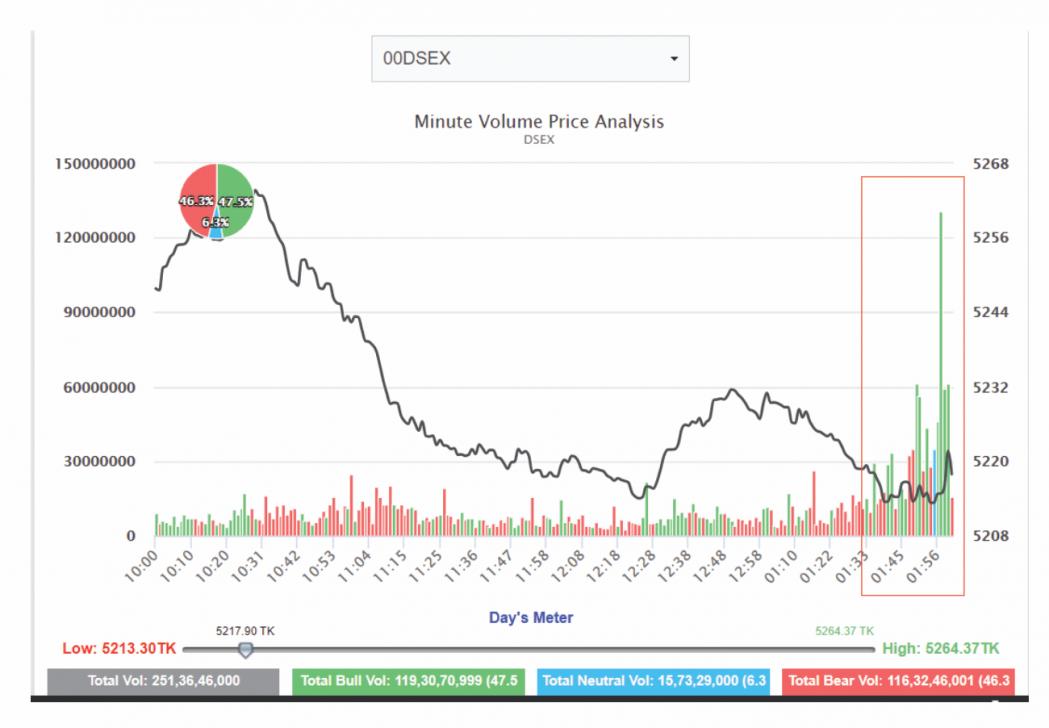DSE turnover hits 13-month low

The stocks have continued to bleed on Dhaka Stock Exchange, pushing the turnover to a 13-month low yesterday despite a raft of measures from the government that aimed to revive the market.
The turnover, an important indicator, dropped 17.59 percent to Tk 251.4 crore, the lowest since March 25, when it was Tk 224.53 crore.
“The impact of the liquidity crunch in the banking sector has spread in the stock market,” said Khairul Bashar Abu Taher Mohammed, secretary general of Bangladesh Merchant Bank Association.
Though some stocks have become lucrative, many institutional investors can not invest in the market as they are suffering from a credit crunch, said Bashar, also the chief executive officer of MTB Capital.
Market insiders say the index and the turnover of the market would have fallen further if one institutional investor did not support the market at the very end of the trading session.
The DSEX, the benchmark index of the bourse, declined 29.91 points, or 0.56 percent, finishing the day at 5,217.91. The index has lost 58 points in the last three trading days.
In the last two months, Tk 35,064 crore, or 8.35 percent, was wiped from the market.
The bleeding continues even after the central bank last week decided to re-allocate a revolving fund of Tk 856 crore to the market to halt the fall. It also agreed to change the definition of market exposure.
The finance minister said some incentives would be given to stock investors in the upcoming budget, to be unveiled next month.
Furthermore, the stockmarket regulator has taken some decisions to halt the fall in share prices.
As per the decisions, the general investors’ quota in the initial public offering shares has been increased by 10 percentage points. Besides, the lock-in period for sponsors and placement shareholders will be counted from the trading day of a stock instead of the day of the issuance of prospectus.
Also, it decided to rein in the blanket bonus share declaration without any reason and control the placement share selling.
“The decisions could not dampen the impact of the liquidity crisis, so the market remains drowsy,” said the managing director of a leading brokerage house, preferring not to be named.
He said the government should take necessary steps to resolve the liquidity crunch at first in order to see a surge in the stock market. “If the money market does not have excess liquidity, how can the stock market go up?”
Excess liquidity stood at Tk 63,921 crore as of February, down 5.82 percent from a month earlier and 14.56 percent year-on-year, according to data from the central bank.
As the liquidity crunch is intensifying, banks are offering 11-12 percent interest on deposits.
The higher deposit rate will draw in idle money to the banking sector, meaning the money will not come to the stock market, said the managing director.
A top official of another brokerage house said the stock market has also been hit by foreign investors as they are opting for sales. As a result, the well-performing stocks are falling the most, he added.
Yesterday, the most negative contributors to the market were Grameenphone, Brac Bank and Square Pharmaceuticals.
Of the traded issues, 76 advanced and 219 declined while 52 securities closing unchanged on the premier bourse.
Fortune Shoes dominated the turnover chart with 41.05 lakh shares worth Tk 15.22 crore changing hands, followed by Jamuna Bank, Brac Bank, Bangladesh Shipping Corporation and Monno Ceramic.
Popular Life Insurance was the day’s best performer with a 9.89 percent gain while RN Spinning Mills was the worst loser, shedding 6.06 percent.
Chittagong stocks also fell with the bourse’s benchmark index, the CSCX, declining 56.43 points, or 0.58 percent, to finish the day at 9,665.02.
Losers beat gainers as 142 securities declined, 52 advanced and 29 finished unchanged on Chittagong Stock Exchange. The port city bourse traded 48.02 lakh shares and mutual fund units worth Tk 14.54 crore.
